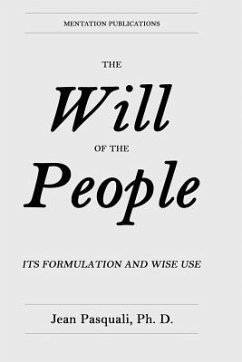The book explores the ways in which human societies have acquired or developed governments that consistently receive low performance approvals by their citizens. There is strong evidence that most governments, independent of type, are constrained by power structures that prevent them to adjust to new needs, new knowledge or new situations. As a consequence, they are not able to allow or foster the people's prosperity and happiness: Much to the contrary, they support or passively accept unnecessary suffering and frustration. By combining the ancient idea of democracy with the use of modern communication technology, it is now possible to devise governmental structures that are flexible and responsive to citizens' needs and preferences. One of the purposes of this book is to show how multiple individual contributions-freely expressed-can play a powerful role in the solution of problems related to government and society; they can also energize creativity and foster social stability. The reader is invited to analyze the structure and performance of his government, to discover possible improvements and to find ways that lead to their adoption. Throughout the text several illustrative and guiding examples are provided. The author, by applying his scientific background to politics, is able to present a non-traditional and refreshing point of view regarding the relationships of the individual with government and society.
Bitte wählen Sie Ihr Anliegen aus.
Rechnungen
Retourenschein anfordern
Bestellstatus
Storno





![Reform Government in Ontario [microform]: the Benefits It Has Conferred Upon the People: Speeches Delivered by the Hon. Oliver Mowat at Woodstock, Thu Reform Government in Ontario [microform]: the Benefits It Has Conferred Upon the People: Speeches Delivered by the Hon. Oliver Mowat at Woodstock, Thu](https://bilder.buecher.de/produkte/65/65605/65605871m.jpg)